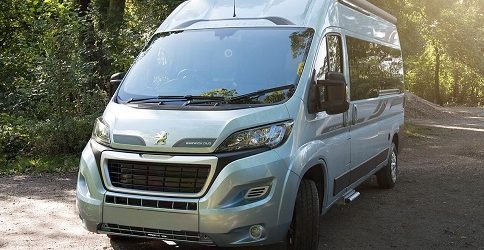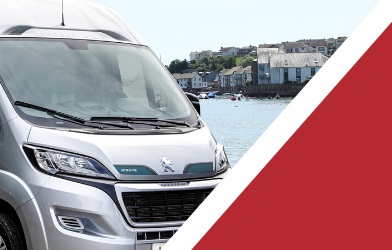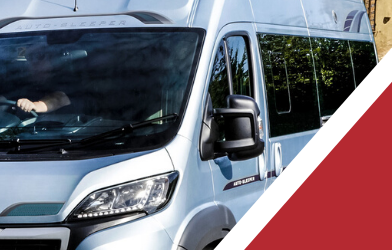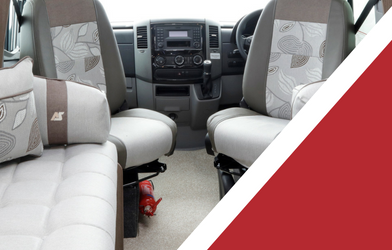If you’ve been bitten by the bug, then sooner or later you’ll be thinking about buying a motorhome – whether it’s new or one that’s pre-loved.
Here, we offer our tips about buying a motorhome – together with some thoughts and suggestions about driving it when you’re sitting behind the wheel of your very own home away from home for the first time.
Stating the obvious
Buying a motorhome is exciting! More often than not, it’s a case of a dream come true.
Without wanting to put any kind of damper on that wonderful feeling, the purchase invariably represents a major financial commitment. To state the obvious, you’ll be taking the purchase very seriously indeed – and our following tips are offered in full recognition of that fact.
Research and research again
You might have to rein in the sheer enthusiasm to prevent your eagerness from getting the better of you. Beware of being pressured into over-hasty buying decisions.
Remember, too, that buying a motorhome isn’t just about price and fittings. Many other things need to be considered including:
- likely fuel consumption;
- inevitable rate of depreciation;
- reliability of your chosen vehicle; and
- ease of re-sale.
You’ll not want to make these kinds of judgements based upon a single motorhome that has attracted your interest and give the necessary considerations just a spare 5-10 minutes of your time. Instead, put some serious time to one side and research the market and your options thoroughly.
How are you going to use it?
It’s highly advisable to sit down and think seriously about how your motorhome will fit into your recreational plans. That might sound glaringly obvious, but a little more thought might show you the value of doing so.
For example, do you see yourself:
- taking very extended holidays in the motorhome;
- using it overseas;
- inviting others, such as family members, to join you on trips at times; or
- taking a lot of home comforts with you every trip?
These are important deliberations because they might play a big part in influencing your choice of motorhome. For example, purchasing one that’s too small or incorrectly configured in terms of the number of berths might restrict how often you can invite others to join you.
Critically assess your requirements
Try not to be overwhelmed by the huge range of choice that’s available – both in terms of different motorhomes, their fittings, and equipment.
Inevitably, each model will have its pros and cons in terms of how it fits into your requirements. Assessing that isn’t something you can easily do from a zero-knowledge base just by looking around a motorhome or two on a dealer’s site.
For starters, therefore, focus instead on some serious internet research about the models you might have become interested in and take the advice of experienced dealers in motorhomes – such as ourselves here at Derby Motorhomes, of course.
The size and type of motorhome you select should be heavily influenced by your own requirements and capabilities. That is likely to depend on your understanding of things such as:
- whether you are happy driving a large vehicle or would prefer a modestly sized motorhome;
- how often you are likely to use it and typically over what distances/durations;
- whether you have a driveway or garage big enough to accommodate it (remember, some local councils might have restrictions on driveway parking of motorhomes and your neighbours might object too) – if not, is there a secure motorhome storage facility relatively close to you and does it have vacancies; or
- whether it is going to be used largely by you alone, you and a partner, or you and a larger family.
All these factors – and others like them – need to be clear in your own mind before hitting the showroom trail.
Be cautious about buying small as a default option
Our motorhome buying tips would not be complete without a very gentle warning about buying a vehicle that is too compact – unless you’re sure that it’ll meet your needs in the medium to longer term.
If you purchase a motorhome that’s perhaps a tad too large for your average needs, then it might represent a marginal cost-inefficiency but having a vehicle that proves to be too small in many cases can be a near insurmountable problem, short of replacing it.
Once again, seek appropriate advice.
Incline towards established brands
This might appear to be a slightly controversial point in motorhome buying tips, but it remains the case that if you choose a well-known marque, with established reliability and a reliable track record in aspects such as build quality and power plant (engine), this can reduce many of the risks in making such a significant investment.
Look carefully at any customization
Naturally, this typically applies only to pre-loved models, but it’s worth noting that some previous owners might have “tweaked” things around the motorhome.
There’s not necessarily anything wrong with that – providing it was done properly and with approved fittings and parts that meet the manufacturer’s standards.
It’s worth being aware that in many cases, DIY customisation and “improvements” reduce the value of a motorhome. In fact, many dealers will remove them from the vehicle so that it is returned to its factory specification before a re-sale. That should tell you something!
Private purchases versus dealerships
On this particular issue, there’s probably no cast-iron or indisputable advice.
Broadly speaking, buying a used vehicle privately might offer you some ticket-price cost savings. However, against that, you’ll need to keep in mind that you’ll typically have no post-sale support or service and your post-sale legal rights when dealing with a private individual may be limited to non-existent.
To help protect your interests if buying privately, carefully check and confirm that:
- the seller is who they say they are and resides at a verifiable address;
- they own the motorhome they’re selling and are not just its registered keeper;
- there is no outstanding finance on it;
- it has not been previously “written off” in insurance terms following an accident or other disaster; and
- that nothing has been “massaged” – such as the vehicle’s age, mileage, or other critical details.
You may pay a little more in terms of the price through a dealership, but you should get that legal protection of your rights and post-sales support.
Know your technical limitations
You certainly don’t need to be a qualified engineer to enjoy a motorhome! Even so, when buying, there may be technical issues that need to be taken into consideration.
If you’re mechanically and vehicle minded, then fine. If you’re not, call upon the help of either someone who is or a quality retailer of motorhomes with the experience to guide you through some of the technology and what it might mean in terms of influencing your final decision.
Prepare your funding options in advance
Finding the wherewithal to finance your purchase, of course, depends on your personal means and circumstances.
You might want to be a little cautious about using your cash reserves or retirement kitty. It may make sense to use one of the various motorhome finance options that might be available to you such as HP, a personal loan or lease purchase, for example.
Look into your options – including potential fund providers – and be sure you’re clear about your overall financial position, before starting to look at vehicles in dealers’ showrooms or on websites.
Motorhome driving tips
Now you’ve bought your motorhome, what about the challenge of driving one?
In fact, you’re likely to discover that – with a little practice and growing familiarity – it is probably no more difficult than driving your own car.
The following tips may help to explain how you may overcome any initial doubts or worries:
Look and learn
- when you get behind the wheel of any vehicle you have not driven before, you usually spend a moment or two familiarising yourself with the controls, so that you know where everything is and know just how it all works – especially in an emergency;
- getting behind the wheel of a motorhome is unlikely to be so different and a few minutes just making yourself comfortable, adjusting the seat, and getting familiar with all the controls is likely to pay dividends;
Training
- you’ve made yourself at home in the cockpit – and the spacious interior, no doubt – so you’re probably looking forward to moving off;
- if there’s still any trepidation, though, or if you want to play it extra safe, you might want to enrol on one of the motorhome courses run by the Caravan and Motorhome Club or the Camping and Caravanning Club;
- these manoeuvring courses aim to teach you all about handling a larger vehicle – forwards and in reverse – simple maintenance, routine safety checks, and the law, with a feedback session typically closing the session;
Moving off
- now that you’ve gained a little confidence, there are just a few things to remember – especially until you’ve become familiar with the length, width, and size of your motorhome;
- the golden rule is to relax, slow down and enjoy the journey (likely to be at least half the enjoyment of outings in your motorhome);
- while you are on the move, you might tend to forget some of the key dimensions – the height and length of your motorhome – so take a look in your owner’s manual and learn them off by heart, so that you are not caught unawares when approaching low bridges or especially narrow and winding roads along the way;
- with the extra length of the vehicle, you may need to take corners wider than you are used to, but be careful, of course, of swinging out into oncoming traffic, slow down and look well ahead when cornering;
- in fact, you might want to kill your speed more generally while getting used to driving your motorhome – it’s not designed to be driven as fast as the car you use for work or trips to the shops and, besides, slowing down may help you to enjoy the journey better;
- if your motorhome is less than 3,500 kg unladen weight (as most are), then the rules of the road, including speed limits are the same as for the car you normally drive – but if it is above 3,500 kg then remember that lower speed restrictions apply;
Park and Ride
- even though you may have become familiar with the handling of your motorhome, it is rarely a clever idea to take it into already congested and sometimes narrow inner-city streets; so,
- Park and Ride schemes are a boon to motorhome owners since they let you park easily away from all the congestion, with your vehicle waiting safely for you at the end of your visit to the city.
By following just a few simple tips and suggestions, therefore, you are likely to find that driving a motorhome presents no great challenge – and you soon take to it like a duck to water.




